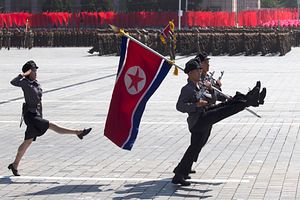On September 9, North Koreans celebrated the 70th anniversary of the Democratic People’s Republic of Korea (DPRK). In highlighting the endurance of the DPRK — whose existence now exceeds that of its former benefactor, the Soviet Union — the occasion suggests that promoting regime change in North Korea is an ill-advised policy. Rather than vainly striving to achieve that objective, the United States can more profitably foster peace on the Korean Peninsula by promoting broader and deeper socioeconomic cooperation between the North and South.
In recent months, U.S. attention to North Korea has focused primarily on the joint statement — particularly with regard to the denuclearization of the Korean Peninsula — that U.S. President Donald Trump and Kim Jong Un issued at the conclusion of their June summit in Singapore. Although some have hailed the agreement as critical to de-escalating tensions in the region, critics have argued the agreement is short on details and enforcement mechanisms. Moreover, subsequent negotiations have yielded so little progress toward denuclearization that the Trump administration pulled Secretary of State Mike Pompeo out of a planned visit to Pyongyang in late August.
Though the denuclearization of the Korean Peninsula is an important long-term objective, Washington’s focus on that issue puts the cart before the horse. Avoiding military conflict is the paramount objective for the United States and the region. Moreover, North Korean nuclear proliferation is a consequence of its precarious geography (surrounded as it is by major powers with a history of bloody conflict) and the antagonism and mistrust that has persisted on the Korean Peninsula since the Korean War. Like the U.S. arsenal, the primary purpose of North Korea’s nuclear weapons is deterrence. In that sense, North Korean nuclear proliferation is a symptom of a larger problem. Rather than simply striving to compel the DPRK to relinquish its nuclear weapons, Washington should endeavor to alleviate the suspicion that has convinced Pyongyang that its survival depends upon such terrible weapons. Even though U.S. conventional and nuclear dominance is sufficient to deter North Korean aggression, it would certainly be preferable to establish a relationship in which deterrence is unnecessary.
Overcoming decades of mistrust will necessarily depend primarily upon the governments in Pyongyang and Seoul. Although that relationship has largely been overshadowed in the United States by the Trump administration’s interactions with North Korea, the fact that the North and South have recently undertaken a number of socioeconomic confidence-building measures is vital.
In February, the two countries fielded a unified women’s hockey team, which competed at the Olympic Games hosted in Pyeongchang. Since then, Kim Jong Un and Moon Jae-in, his South Korean counterpart, have met three times and scheduled another summit later this month in Pyongyang. Over the course of those talks, Moon has expressed interest in establishing cross-border road and rail links.
Although Pyongyang and Seoul must assume primary responsibility for overcoming the challenges that have divided the peninsula for seven decades, the United States has a crucial role to play in that process. The burgeoning diplomatic relations between North and South Korea are merely tentative steps on a long journey of reconciliation. It is therefore crucial for the United States to foster momentum by supporting cooperative North-South initiatives. Since Korean efforts to establish cross-border socioeconomic ties stand little chance of success if Washington insists on isolating and pressuring North Korea — an approach that has only served to heighten mistrust — the United States should be prepared to support a quid-pro-quo confidence-building process.
Just as important, the United States should refrain from any military initiatives that Pyongyang might perceive as provocative. For the past 65 years, the United States’ primary responsibility on the Korean Peninsula has been one of reassurance — to reassure the Republic of Korea that it can depend upon the U.S. military for its survival. Unfortunately, many of the measures the United States has taken toward that end have heightened North Korea’s sense of insecurity.
Reconciliation between North and South Korea will therefore require U.S. policies that reassure Pyongyang that the ongoing U.S. presence in South Korea poses no threat to North Korea. On that count, Trump deserves credit for pledging to suspend the annual U.S.-South Korean joint military exercises, which he characterized as “very provocative.” In addition, the United States should seriously consider negotiating a peace treaty officially ending the Korean War that includes a pledge not to employ military force to effect regime change in North Korea. It is difficult to envision the eventual denuclearization of the Korean Peninsula in the absence of such an agreement. Yet that type of commitment would not diminish the United States’ ability to deter aggression against South Korea.
Overcoming 70 years of mistrust is bound to be a fitful, decades-long process. But doing so is essential to forging a durable peace on the Korean peninsula. For that reason, the United States should throw its full support behind the burgeoning North Korea-South Korea dialogue — even if that means putting denuclearization on the back burner.
Brad Stapleton is a former Visiting Research Fellow at the Cato Institute. Stapleton also served as an adjunct researcher at the RAND Corporation. He earned a PhD in political science from the University of California, Los Angeles, as well as a BS and MA from the Edmund A. Walsh School of Foreign Service at Georgetown University.

































